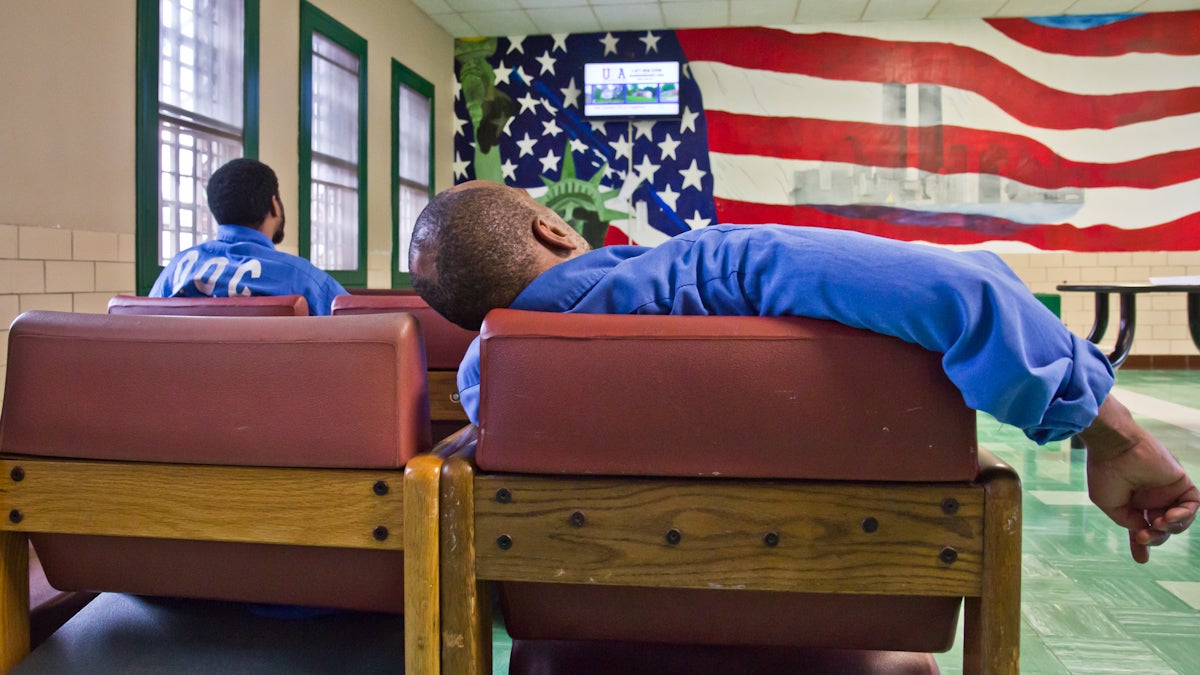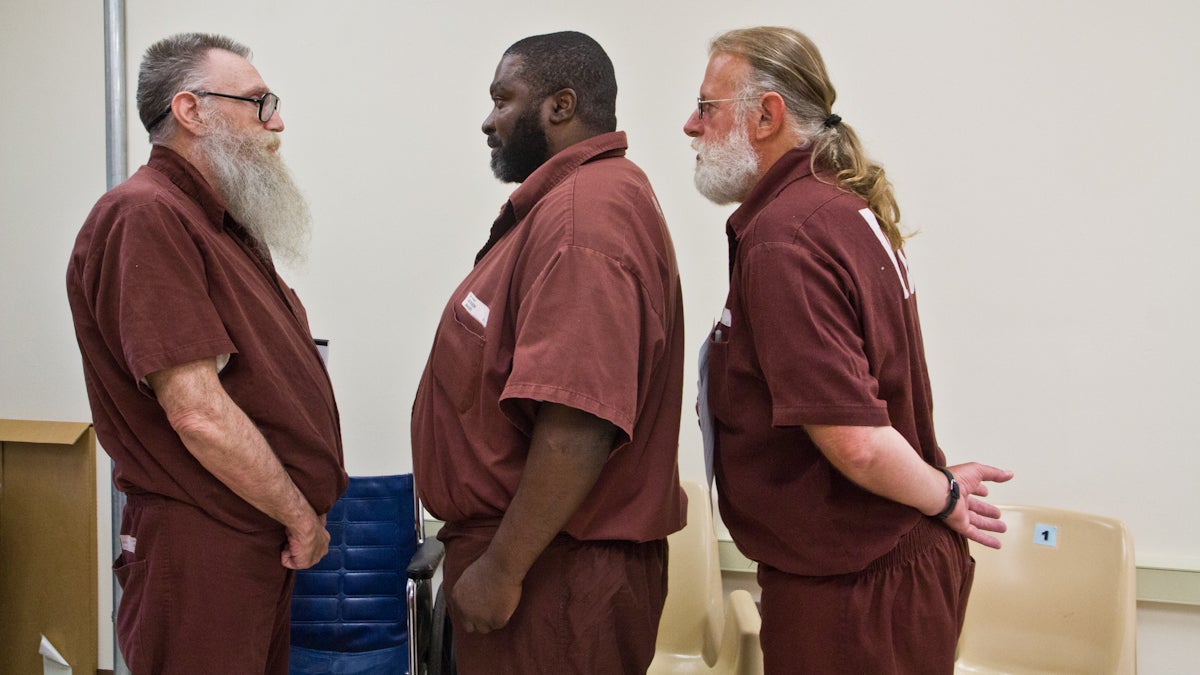Pennsylvania training mentally ill inmates to help others on the cellblock
Listen
Inmates in the Forensic Treatment Center at SCI Waymart in Wayne County, Pa., watch television. The FTC houses the state's most seriously mentally ill inmates. (Kimberly Paynter/WHYY)
Way up in Northeastern Pennsylvania near the New York state border, SCI Waymart houses the state’s most seriously mentally ill prisoners — those serving time while suffering with schizophrenia, major depression and other disorders.
If you go through the metal detectors and down a winding series of hot, echoing hallways in the Wayne County prison, eventually, you’ll find a classroom. This is where 11 of SCI Waymart’s nearly 1,500 prisoners gather for training to help their fellow inmates cope with mental illness.
On a recent morning, the group, dressed in brown uniforms and scuffed white sneakers, was doing an exercise to practice empathizing with people who hear voices others can’t.
“I’ve heard voices in my past, so I already know how to do this,” said inmate Brandon, whose last name we are witholding in accorance with Pennsylvania Department of Corrections policy.
While another inmate was trying to carry on a conversation with two other men, Brandon leaned in and whispered into his ear, “Do you think you can trust him?”
Brandon and these 10 other inmates are SCI Waymart’s certified peer-support specialists.
Since the 1980s, peer support has gained widespread use for helping to treat people with behavioral health conditions. The concept is based on the notion that people feel more comfortable talking to others with similar experiences.
“We used to be a medical model,” said Lynn Patrone, the DOC’s mental health advocate. “The doctor told us what we needed, what the treatment was. Now, they’re able to talk to somebody and that person will say, ‘I’ve been where you are. I’ve been down in that very dark place.’ And this light bulb goes off. The person says, ‘How’d you get from there to where you are now?'”
While peer support has been used in the community for more than 30 years, it is a new concept for the criminal justice system. But, given nearly 30 percent of Pennsylvania inmates have been diagnosed with some form of mental illness, experts say they are serving a vital need.
“Prison is not a therapeutic environment, so our ideal of course would be diverting people with mental health and substance use disorders away from prisons entirely,” said Alyssa Schatz, head of advocacy and policy at Philadelphia-based Mental Health Partnerships. “Unfortunately right now, our system just doesn’t have the capacity that’s needed to divert people away from the system, so in lieu of that it’s great to have some services that are appropriate.”
To become a certified peer-support specialist, eligible Pennsylvania inmates must first be willing to speak openly about their own mental illness. Then, they must go through 75 hours of training and pass an exam. Another 18 hours of continuing education is required each year so they can continue to help guide other inmates on their path to stability.
Sometimes, it’s a conversation about their dreams or goals and how they might accomplish them. Sometimes, it means recognizing when a fellow inmate may be considering suicide and taking steps to try to prevent that from happening.
While all of SCI Waymart’s staff is trained in mental health first aid, Patrone said these inmates have become a critical part of mental health care here and are frequently called in by staff to help with crises.
“It takes away the clinical,” Patrone said.
 Inmates at Waymart Prison simulate what it’s like to hear voices during a certified peer support specialist training session. (Kimberly Paynter/WHYY)
Inmates at Waymart Prison simulate what it’s like to hear voices during a certified peer support specialist training session. (Kimberly Paynter/WHYY)
Federal investigation leads to culture change
SCI Waymart has long had a good reputation for treating mentally ill inmates. The prison inhabits the bucolic grounds and old brick buildings of the former Farview State Hospital for the Criminally Insane, which opened in the early 1900s. It became a state correctional institution in 1989, when the first busload of inmates arrived from SCI Camp Hill in Cumberland County where 208 people were injured during three days of riots.
“Understanding the problems of human beings seems to have stayed in the genes of the institution,” said Carole MacAllum, who has been volunteering and teaching at SCI Waymart with the Pennsylvania Prison Society since 2000.
But, for many years, that was not the case at other Pennsylvania state prisons.
In 2014, investigators with the U.S. Department of Justice found that mentally ill inmates were twice as likely as other prisoners to be placed in solitary confinement.
The investigation spurred a much-needed culture change across the system, said Jack Sommers, superintendent of SCI Waymart.
“Eight years ago, if you got into an altercation with a mental health inmate and that mental health inmate might have punched you in the eye, the inmate probably would have went to the restrictive housing unit for maybe 30 to 90 days,” he said.
Things are very different now, said Sommers, who has worked in three other state prisons.
“Today’s culture is the severely mental health inmate would punch you in the eye [and] four hours later, that person would be back on the unit, shaking your hand, saying, ‘I’m sorry’ and everybody goes on with their day.”
Last year, the Justice Department closed its investigation, saying in a letter to Gov. Tom Wolf it was satisfied with the many changes the state has been making, including the new peer-support program.
A sense of purpose
Today, about 600 inmates at 25 facilities across the state have been certified as peer-support specialists. It’s considered a job; at SCI Waymart, it pays 51 cents an hour, the highest-paying position for inmates in the prison, officials said.
“I’m here for a reason, and it’s not just the crime I committed,” said Joseph, who is serving four to 10 years for possession of child pornography and a firearms charge. He’s been a peer-support specialist here for one-and-a-half years.
Recently, he helped a fellow inmate with a high-functioning form of autism spectrum disorder most people call Asperger’s syndrome.
“Because of his Asperger’s, he does a few things that are a little inappropriate — funny, but inappropriate — and they wouldn’t let him go to yard,” Joseph said.
He noticed that losing time outside was making things worse for the man, so Joseph brought the issue to Patrone, who spoke to some of the prison staff.
“Now he’s allowed to go out to yard. He has a great time out there, it helps him a lot and he’s just a great guy,” he said.
Beyond giving him a sense of purpose, the program has given Bailey a professional certification he can take with him when he’s released.
The Department of Corrections does not know how many inmates have gone on to be certified peer-support specialists on the outside, according to spokeswoman Amy Worden, but Patrone said she has heard from a few former prisoners who have.
Prison officials say, anecdotally, the program also appears to help bring down the number of violent incidents between inmates and staff.
To Patrone, a major benefit is helping inmates who are coping with mental illness themselves feel useful and motivated, especially for the lifers.
“One of the biggest things that impacts me is when the certified peer specialists say to me, ‘I have purpose.’ And I think about that from my perspective — if I were incarcerated for my entire life it’d be pretty hard to find purpose, right?”
WHYY is your source for fact-based, in-depth journalism and information. As a nonprofit organization, we rely on financial support from readers like you. Please give today.




